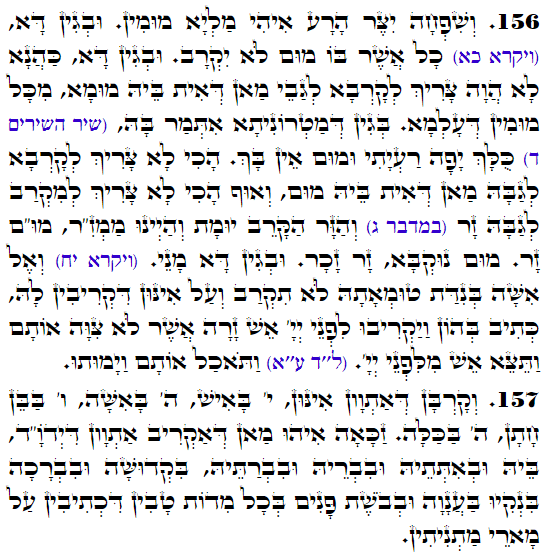Daily Zohar # 3903 – Tzav – Humility and purity
Daily Zohar 3903

Hebrew translation:
157. וְקָרְבָּן שֶׁל אוֹתִיּוֹת הֵם, י’ בָּאִישׁ, ה’ בָּאִשָּׁה, ו’ בַּבֵּן חָתָן, ה’ בַּכַּלָּה. אַשְׁרֵי מִי שֶׁמַּקְרִיב אוֹתִיּוֹת יְהֹוָ”ה בּוֹ וּבְאִשְׁתּוֹ וּבִבְנוֹ וּבְבִתּוֹ בִּקְדֻשָּׁה וּבִבְרָכָה, בִּנְקִיּוּת, בַּעֲנָוָה וּבְבֹשֶׁת פָּנִים, בְּכָל מִדּוֹת טוֹבוֹת שֶׁכְּתוּבוֹת עַל בַּעֲלֵי הַמִּשְׁנָה.
.
I made a mistake yesterday. I posted the study of DZ 3903 in DZ 3902 (yesterday). To keep the studies in order, I made the correction to DZ 3902, so if you missed it, please use the link above to go back and read DZ 3902, then 3903 again.
Zohar Tzav
#156
The Klipa is called ‘שפחה,’ a female slave, and refers to the evil inclination. She is full of malformations, and because of that, the Torah forbids any person with a defect to serve in the holy.
Leviticus 21:17
“דַּבֵּר אֶל אַהֲרֹן לֵאמֹר אִישׁ מִזַּרְעֲךָ לְדֹרֹתָם אֲשֶׁר יִהְיֶה בוֹ מוּם לֹא יִקְרַב לְהַקְרִיב לֶחֶם אֱלֹהָיו.”
“Speak to Aaron, saying: ‘No man of your descendants in succeeding generations, who has any defect, may approach to offer the bread of his God.”
The Shechina in Malchut is perfect and won’t accept anyone with defects, as we read;
Songs 4:7
“כֻּלָּךְ יָפָה רַעְיָתִי וּמוּם אֵין בָּךְ.”
“You are all fair, my love, And there is no flaw in you.”
Numbers 18:7
“וְאַתָּה וּבָנֶיךָ אִתְּךָ תִּשְׁמְרוּ אֶת כְּהֻנַּתְכֶם לְכָל דְּבַר הַמִּזְבֵּחַ וּלְמִבֵּית לַפָּרֹכֶת וַעֲבַדְתֶּם עֲבֹדַת מַתָּנָה אֶתֵּן אֶת כְּהֻנַּתְכֶם וְהַזָּר הַקָּרֵב יוּמָת.”
“Therefore thou and thy sons with thee shall keep your priest’s office for everything of the altar, and within the vail; and ye shall serve: I have given your priest’s office unto you as a service of gift: and the stranger that cometh nigh shall be put to death.”
The “Stranger” refers to the male and female of the Klipa that has defects and are not worthy of coming closer to the Holy.
Leviticus 10:1
“וַיִּקְחוּ בְנֵי אַהֲרֹן נָדָב וַאֲבִיהוּא אִישׁ מַחְתָּתוֹ וַיִּתְּנוּ בָהֵן אֵשׁ וַיָּשִׂימוּ עָלֶיהָ קְטֹרֶת וַיַּקְרִבוּ לִפְנֵי יְהוָה אֵשׁ זָרָה אֲשֶׁר לֹא צִוָּה אֹתָם.”
“Then Nadab and Abihu, the sons of Aaron, each took his censer and put fire in it, put incense on it, and offered strange fire before YHVH, which He had not commanded them.”
Nadav and Avihu were not perfect, and the fire and the Ketoret they brought as the offering was considered “Stranger.” Because of that, they died by a fire from Hashem that came out and consumed them (Leviticus 10:2).
#157
The offering of the letters of the Holy Name is in the unification.
The letter Y י has the aspect of man; the H ה is the woman, the V ו is the son. The groom and the last letter H ה is for the daughter, the bride.
Man and woman make a union of the Y י and the H ה, and all other relations should be with holiness, blessing, purity, humbleness, and all good traits taught by the sages.
Lesson;
Everything we do is supposed to be properly made to draw the Light from the Holy levels into our lives. Humility and purity are qualities to have before coming before the Holy one asking for fulfillment.
Nadav and Avihu had a pure consciousness. They wanted to make a unification that would make an everlasting flow of Light to the world using the Holy Tabernacle on its first activation. It was not the time, nor their duty, because their father, Aaron, was alive and had the position of the High priest. They lacked humbleness because they did not wait for their father.
When we pray to fulfill a wish, we should recognize that we may not be worthy of what we are about to ask from Hashem because we have our flaws. We ask first to forgive our flaws, and by the merits of the Tzadikim, we ask our wish. We ask Hashem to fulfill our wish only if it is good for our future because we can not see the future outcome even if we are certain that our desires are pure and altruistic.
We always include in our prayers a request for support to stay on the righteous path and the study of Torah and Zohar.
We conclude our personal prayer with;
Connect to certainty
Psalm 32:10
“וְהַבּוֹטֵחַ בַּיהוָה חֶסֶד יְסוֹבְבֶנּוּ” “He who trusts Hashem, mercy shall surround him.”, Amen.
Pleading. (three times)
Psalm 69:14
“וַאֲנִי תְפִלָּתִי לְךָ יְהוָה עֵת רָצוֹן אֱלֹהִים בְּרָב חַסְדֶּךָ עֲנֵנִי בֶּאֱמֶת יִשְׁעֶךָ.”
“But as for me, my prayer is to You, O YHVH, in the acceptable time; O God, in the multitude of Your mercy, Hear me in the truth of Your salvation.”
Submitting.
Psalm 19:15
“יִהְיוּ לְרָצוֹן אִמְרֵי פִי וְהֶגְיוֹן לִבִּי לְפָנֶיךָ יְהוָה צוּרִי וְגֹאֲלִי.”
“May the words of my mouth and the meditation of my heart Be acceptable in Your sight, YHVH, my rock and my Redeemer.”
There are many secret codes in Psalm. The above verse has 10 letters Yי and 42 letters in total. We conclude all our important prayers with this verse.
{||}

 Previous: Tzav
Previous: Tzav
